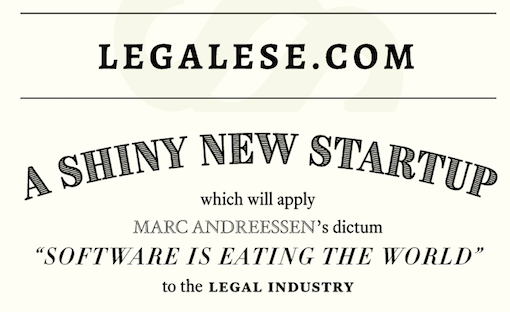
Smart Contract pioneer Legalese has won a significant vote of confidence from California-based blockchain tech incubator, String Labs, in the shape of a development grant.
String Labs is funding innovation in open blockchain finance and is currently backed by several venture capital funds including the Beijing-based ZhenFund and Palo Alto-based Amino Capital.
Although the grant to Legalese is financially small, $8,888, the symbolic vote of confidence from a cutting edge group such as String Labs is important and shows faith in Legalese’s development of a new language, known as L4, for the creation and validation of smart contracts.
The idea of L4 is to develop a computer language that can produce reliable legal contracts, or ‘smart contracts’, given that these legal agreements will be self-executing. These contracts would be the legal equivalent of contracts written in everyday language and lawyer jargon, though formed out of code.
The benefit would be that because an L4 contract is written in code it could be tested thoroughly for completeness, ‘bug’ removal and also for future projection and modelling of different outcomes created by the contract.
Unlike a natural language legal contract that may contain vague legal terms and potentially even contradictory or missing contractual information an L4 contract would not, as it could be tested first. The contract can also then be ‘compiled’, or translated into English or any other language, potentially giving it universal legal use.
Also, because L4 is founded on legal thinking it is hoped it will be better at creating contracts than programming languages currently in use to build smart contracts, which in most cases were not built from the ground up with legal issues in mind.
In this case String Labs is interested in L4’s potential to be applied to its goal of developing ‘open chain’ financial systems based on the Ethereum* blockchain that can operate globally and in competition with the more limited blockchain networks now being created by banks and other financial institutions.
The need for better contracts within blockchains and DAOs (Decentralized Autonomous Organisations) was shown recently following the exploitation of ‘The DAO’**, which put $100m of ether cryptocurrency at risk due to what is believed to be a loophole in one of the organisation’s financial smart contracts.
As noted by blockchain experts, smart contracts that are on a public blockchain have a particular vulnerability because their code is there for all to see, that in turn can mean that bugs, exploits and security holes are visible, if they exist.
Using L4, which is forged out of an understanding of legal terms and legal norms, should avoid the creation of such bugs in the first place, or be able to remove them where they are found.
Wong Meng Weng, a co-founder of Legalese said: ‘This is deep tech. L4 will be to contracts what SQL is to databases.’
Meng and his team stressed that finding bugs in smart contracts had huge benefits. This is because, ‘finding bugs at runtime – that’s called litigation’. That is to say, law firms and their clients usually only find there is a problem with a legal agreement when something goes badly wrong in the real world.

Tom Ding, CEO and co-founder of String Labs said: ‘As witnessed with The DAO hack incident the consequences of flawed financial smart contracts are extremely costly. We hope that new technologies like L4 will provide a firm foundation for secure smart contracts.’
Legalese co-founder Meng added in relation to the funding from String Labs: ‘It’s not about the money; it’s more about the symbolism and a vote of confidence.’
‘Actually, the money itself, whilst much appreciated, caused us to burn a day of our activities by having to go open a bank account. In person,’ he concluded ironically.
* Ethereum is a decentralized platform that runs smart contracts. While ‘ether’, developed by the Ethereum Project, is currently the second most widely used digital currency, or cryptocurrency, according to the latest report from CoinMarketCap.com, with a market capitalisation of $1bn (21 July 2016). In comparison Bitcoin has a market cap of around $10.45bn, while the third most successful currency is STEEM, with a market cap of $341m.
** ‘The DAO’ is in fact just one of many DAOs in existence.
